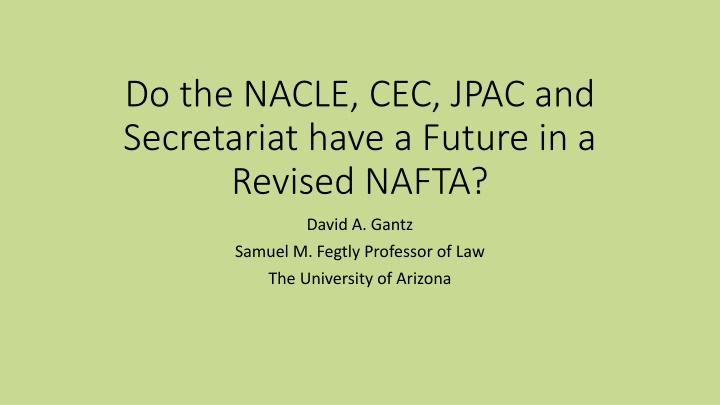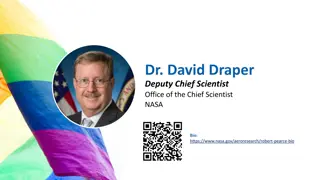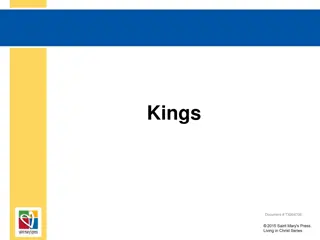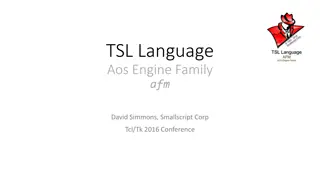
NACLE, CEC, JPAC, and Secretariat Future in Revised NAFTA Negotiations
Explore the potential future of NACLE, CEC, JPAC, and Secretariat in a revised NAFTA agreement amidst challenges and differing stakeholder opinions. Analyze US objectives related to the environment and their impact on the renegotiation process.
Download Presentation

Please find below an Image/Link to download the presentation.
The content on the website is provided AS IS for your information and personal use only. It may not be sold, licensed, or shared on other websites without obtaining consent from the author. If you encounter any issues during the download, it is possible that the publisher has removed the file from their server.
You are allowed to download the files provided on this website for personal or commercial use, subject to the condition that they are used lawfully. All files are the property of their respective owners.
The content on the website is provided AS IS for your information and personal use only. It may not be sold, licensed, or shared on other websites without obtaining consent from the author.
E N D
Presentation Transcript
Do the NACLE, CEC, JPAC and Secretariat have a Future in a Revised NAFTA? David A. Gantz Samuel M. Fegtly Professor of Law The University of Arizona
Introduction Whether NAFTA 2.0 negotiations can be successfully concluded is problematic: Administration s focus on US trade deficit with Mexico has overshadowed all other aspects of a 24 year old agreement that has resulted in regional trade of $1.2 trillion per year and created millions of jobs in each of the three countries Administration has proposed a list of changes, apparently on a take it or leave it basis, most of which have been or will be rejected by the other Parties Timing of complex negotiations is unfortunate, given Mexican presidential election July 1 and US Congressional elections in November US stakeholders are divided on inclusion of ISDS, as are Members of Congress, many of whom have been opposed to NAFTA and other trade agreements for 25 years or more CEC, November 8, 2017 2
Introduction, Contd President s characterization of NAFTA as the worst trade agreement ever may make it politically difficult for the Administration to compromise on a modernized NAFTA (without trade restrictive practices) and assures that NAFTA will remain an explosive issue in the Congressional election period Trade disputes with Canada relating to softwood lumber (again) and commercial jet aircraft (Bombardier) have made it more difficult for Canadian Government to compromise on such issues as eliminating or modifying AD/CVD dispute settlement mechanism (Chapter 19) and liberalizing dairy imports Administration rhetoric has angered Mexican leaders and citizens, making any apparent concessions difficult politically for GOM, particularly in the months leading up to the presidential election CEC, November 8, 2017 3
Summary of US Objectives Relating to Environment (July 17, 2017) These features are based on TPP Chapter 20: Bring environment into text of agreement Enforceable obligations subject to same dispute settlement as trade issues Avoid waiver of environmental obligations to encourage investment Ensure that NAFTA countries do not fail to enforce environmental obligations through recurring course of action or inaction Implement and maintain obligations under select MEAs Establish a means for stakeholder participation, including commitments for public advisory committees, and a process for the public to raise concerns directly with its government if they believe it is not meeting its environment commitments CEC, November 8, 2017 4
Summary, Contd Require NAFTA countries to ensure access to fair, equitable and transparent administrative and judicial proceedings for enforcing their environmental laws, and provide appropriate sanctions or remedies for violations of their environmental laws Provide framework for conducting, reviewing, and evaluating cooperative activities that support implementation of the environment commitments, and for public participation Establish senior-level Environment Committee to oversee implementation of environment commitments, with opportunities for public participation in the process. Address illegal fishing, fisheries subsidies, and conservation of marine species Protect and conserve flora and fauna and ecosystems CEC, November 8, 2017 5
Environmental Issues in the Negotiations Unclear which of these stated objectives are still Administration policy Note absence of any mention of an independent secretariat; issues are to be raised with member governments Environment chapter does not appear to have been discussed in the negotiations to date, but it seems clear from earlier discussions that Environmental provisions would be included in the body of the agreement Violations would be subject to the same state-to-state dispute system as trade disputes (all of which may be effectively non-binding) Since environmental and labor chapters have been included in all US post-NAFTA FTAs, and are mandated in TPA, they will be included in a revised NAFTA if one is agreed upon; otherwise Congressional approval would likely be impossible CEC, November 8, 2017 6
Future of NAAEC/CEC/JPAC/Secretariat NAALC would disappear, to be replaced with an environmental chapter in the body of the agreement, which may include many of NAAEC s core objectives, with additions as noted earlier Some sort of high level Environmental Committee would be created, with representatives of each government environmental agency, as with other contemporary FTAs such as KORUS and TPP Something similar to JPAC appears to be contemplated in July 17 guidance Except for CAFTA-DR, no post-NAFTA US FTA environmental chapter incorporates a mechanism with a quasi-independent secretariat CEC, November 8, 2017 7
Future, Contd Environmental groups and their supporters in Congress have historically focused on making environmental rules subject to the same state to state dispute resolution mechanism used for trade disputes Most have paid relatively little attention to the fact that such mechanisms are seldom used for any purpose; the last NAFTA chapter 20 panel decision was issued in February 2001 While environmental dispute settlement is likely to be subject to the same state-to-state mechanism as trade disputes, Administration seeks to make that mechanism effectively non-binding CEC, November 8, 2017 8
Survival of the Secretariat? Most important functions of the Secretariat/Citizen petition process have not been replicated subsequent to NAFTA Seems unlikely that concept of a quasi-independent secretariat will survive: NAAEC is deeply flawed, particularly with regard to dispute settlement and ability of governments to stonewall compilation of factual records, which has eroded environmental NGO support Most Canadian provinces have never ratified the NAAEC, suggesting that even the most environmentally friendly of the NAFTA Parties is not a strong supporter of the mechanisms None of the NAFTA Parties have been particularly supportive of the secretariat for many years CEC, November 8, 2017 9
Secretariat, Contd Parties have been uncooperative with many of Secretariat s efforts to compile factual records Parties through CEC have repeatedly delayed responding to citizen petitions, discouraging submission of petitions by most environmental groups in recent years Annual financing has remained at $9 million level since 1994 Trump Administration has proposed reducing US contribution from $3 million to $1 million and generally seeks to roll back most US environmental regulations adopted in the past several decades Strong arguments could be made for retaining the research and report preparation function of the Secretariat, probably the best hope for some sort of ongoing secretariat to preserve current expertise CEC, November 8, 2017 10
Conclusion: Three Important Questions What government or stakeholders will strongly support a continued future for the Secretariat and the NAAEC process for citizen complaints and factual records? Will environmental groups support provisions in NAFTA that could be significant in protecting the environment, including restricting illegal fishing, elimination of fisheries subsidies, promoting biodiversity, strengthening MEAs and banning the harvest of tropical hardwoods, or will they simply continue to oppose NAFTA regardless of form or content? CEC, November 8, 2017 11





















